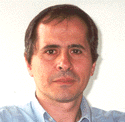Crisanti:Crisanti
From OpenWetWare
Jump to navigationJump to search
 |
Professor Andrea Crisanti

Position
Principal Investigator
Division of Cell and Molecular Biology
Sir Alexander Fleming Building
Email: a.crisanti@imperial.ac.uk
Research Interests
- Development of gene transfer technology for anopheline mosquitoes: During the last years we have developed, evaluated and adapted different components of the gene transfer technology to anopheline mosquitoes: i) assessment of different selectable markers: ii) development of transformation constructs using transposable elements; iii) a novel methodology for injecting anopheline eggs. In Drosophila the development of gene transfer methodologies has promoted, in a short time, an extraordinary flow of information concerning hundreds of genes involved in embryogenesis, tissue modelling, intracellular signalling, neuronal organisation and insect behaviour. This progress shows the impact that transgenic mosquito technology is anticipated to have in expanding the biological knowledge of anopheline mosquitoes. Gene transfer technology would also allow us to investigate the function and the genetic basis of mosquito molecules involved in the interactions between mosquitoes and the malaria parasites.
- Malaria parasite molecules and ligands involved in sporozoite invasion of mosquito salivary glands and vertebrate host cells: The invasive stages of apicomplexan parasites, including malaria sporozoites possess a unique sub-cellular structure, the apical complex that consists of a polar ring, subpellicular tubules, and secretory vesicles such as micronemes and rhoptries. Several research groups including ours have shown that micronemal proteins are involved in the recognition of host cell ligands by apicomplexan parasites. In P. falciparum the micronemes were shown to contain an adhesive proteins (TRAP) encompassing the thrombospondin (TSP) type I repeat and the A-domain of integrins. Experimental evidence mainly originated from our laboratory would indicate that TRAP plays a crucial role in two key steps of parasite invasion of host-cells: gliding motility and recognition of specific cell ligands. We have shown that P. berghei sporozoites shed a trail of TRAP during gliding and antibodies against this micronemal protein dramatically blocked parasite locomotion. Moreover, TRAP knock-out sporozoites were not motile, failed to infect susceptible animals and did not invade mosquito salivary glands. Recently, we have carried out in vivo mutational analysis and demonstrated that TRAP is implicated in the recognition and invasion of mosquito salivary glands by Plasmodium sporozoites and that this process is functionally distinct from its involvement in gliding motility and invasion of host hepatocytes. Our current research interest is now focused at identifying parasite molecules interacting with TRAP in the invasion process of mosquito salivary glands and vertebrate host cells.
- Functional genomics of apicomplexan parasites: We have established a facility for generating DNA chips with the aim to perform functional genomics in apicomplexan parasites. The laboratory is now equipped with a robot for micro-deposition and a laser scanning system worth more than £ 200,000. We are now employing this technology to identify genes differentially expressed by P. berghei and P. falciparum parasite during their life cycle. This technology is anticipated to unravel the function of unknown genes and to elucidate how large groups of genes are functionally linked together. This information would be invaluable for expanding the basic knowledge of parasite biology and to design novel control measures.
Education
- 1973-79 Studies in Medicine at the University of Rome "La Sapienza", School of Medicine;
- 1979 Degree in Medicine and Surgery 110/110 cum laude (with distinction); overall class of degrees 109,98/110 (best of the course);
- 1980-81 Hospital internship at the Catholic University of Rome;
- 1982 Fellowship award (three years) for a post graduate research training in immunology and biotechnology sponsored by the Italian Research Council (CNR);
- 1983-86 Post graduate student at the Basel Institute for Immunology in the laboratory of Prof. Harald von Boehmer;
- 1987 Postgraduate degree in Immunology and Biotechnology awarded by CNR (equivalent of PhD);
- 1987-90 Post-doctoral fellow in the laboratory of Prof. Hermann Bujard at the Zentrum Molekulare Biologie ZMBH, University of Heidelberg sponsored by an EMBO fellowship award;
- 1991-94 Principal investigator of the Italian Ministry for Research and Technology and director of the laboratory of Immunology and Molecular Parasitology at the Institute of Parasitology, University of Rome "La Sapienza";
- 1994-97 Lecturer at the Department of Biology, Imperial College for Science Technology and Medicine, London;
- 1997-00 Reader in Molecular Parasitology, Imperial College for Science Technology and Medicine, London;
- 2000-to date Professor in Molecular Parasitology, Imperial College for Science Technology and Medicine, London